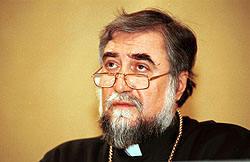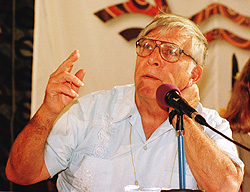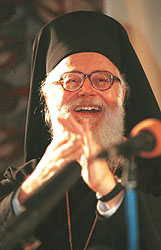The founders of the World Council of Churches in 1948 vowed to demonstrate to the world the visible oneness of the Christian community. But 50 years later church unity remains an elusive goal.
From the beginning, deep theological differences over baptism and the eucharist have complicated attempts to worship together. Unrest among the WCC's Orthodox member churches cast a particularly dark shadow over preparations for the eighth assembly. During the year prior to the assembly the Orthodox churches in Georgia and Bulgaria withdrew from the WCC. The Russian Orthodox Church, the Council's largest member church, reduced its assembly delegation from 25 to 5 -- none of them a bishop. The 960 WCC delegates arrived in Harare wondering if their fragile fellowship could weather the tensions.
"The situation is indeed critical," declared central committee moderator Aram I, catholicos of the Armenian Apostolic Church (Cilicia), in his report to the delegates soon after the assembly opened. "Unless the assembly takes this present situation seriously, I fear that the Orthodox participation will steadily dwindle."

His Holiness Aram I
Photo by Chris Black/WCC. Click on the photo to order (ref. 7078-02)
The moderator is the primate of one of the WCC's five member churches from the Oriental Orthodox
family These ancient churches did not accept the theological definitions of the Council of Chalcedon
in 451. While significant steps towards reconciliation between these churches and the so-called
Eastern Orthodox churches have been taken in recent years, it is the latter church family which has
been most vocal in spreading its unease and dissatisfaction with the WCC.
While Aram refused to label the Orthodox-WCC tensions a "crisis", others present at the assembly
were less hesitant about using the term. "Yes, it is a crisis," insisted Livingstone A. Thompson, a
minister in the Moravian Church in Jamaica. "It is clear that the Orthodox community is in a state of
deep concern, which requires immediate action."
Aram said Orthodox concerns centre on "the controversial nature and perceived irrelevance of some
of the Council's programmatic activities to the life of Orthodox churches". Many of the Orthodox, he
explained, "have come to regard the Council as a Western, Protestant and liberal movement..."
Orthodox members also express discomfort with the WCC's style of decision-making, preferring
dialogue and consensus to majority vote. The current style of operating, Aram said, is "essentially a
model derived from political life and is not necessarily the best way to express the self-understanding
of a ‘fellowship of churches'".
Orthodox leaders insisted that in spite of their criticisms of the WCC they remained thoroughly
committed to ecumenism. Leonid Kishkovsky, a delegate from the Orthodox Church in America,
praised the WCC for bringing together for the first time two branches of Orthodoxy, the Oriental
Orthodox and the Eastern Orthodox churches, to discuss open communion. "At its best the World
Council of Churches has been a place where Eastern and Western Christianity have met," he
said.
"We want the WCC to be radically reformed, so it becomes a true home for Orthodox in the 21st
century," said Hilarion Alfeyev, leader of the Russian Orthodox delegation. His remarks came during
debate on a document entitled "Towards a Common Understanding and Vision of the WCC" (CUV), designed to focus and give new direction to the work of
the WCC.
The CUV document has already provided the basis for a major restructuring of WCC staff and
operations, but the changes do not go far enough to satisfy many Orthodox church representatives.
They would like to see the Council transformed so that it becomes representative of the main
"church families" rather than of individual churches. Unless that happens, they say, the Orthodox
churches will remain a minority voice in the Council, drowned out by the more numerous Protestant
church bodies.
Some of the Protestant church representatives grew impatient with debates over structure and
representation. "Just what is the problem?" asked Rose Hudson-Wilkin, a minister in the Church of
England in a riveting address to the assembly that prompted prolonged applause. "Brothers and
sisters, surely this is about power. Let's be honest and name it for what it is -- instead of wrapping it
up in theological and ecclesiological language."
* set up a special commission to study and analyze issues related to the participation of Orthodox
churches in the WCC. The commission will work for at least three years and will draw up proposals
about "necessary changes in structure, style and ethos of the Council";
* endorsed a major policy statement, titled "Towards a Common Understanding and Vision for the
World Council of Churches" (CUV), which affirms the primary understanding of the WCC as a
"fellowship of churches" and attempts to position the organization for renewed vitality and unity as it
enters its second half-century;
* affirmed a suggestion by moderator Aram I that Eastern and Western churches move towards a
common celebration of Easter, taking advantage of the fact that Easter falls on the same date (April
15) in the year 2001 in both the Gregorian and Julian calendars;
* affirmed a progress report from the Joint Working Group which monitors relations between the
Roman Catholic Church and the WCC;
* approved the formation of a WCC-Pentecostal Joint Working Group;
* encouraged the WCC and its member churches to continue the search for new forms of
relationships with evangelicals, drawing on the many evangelicals in WCC member churches.


